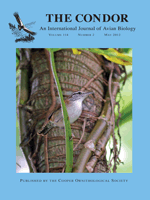For most bird species, biparental care is expected to play an integral role in offspring survival. Nevertheless, relatively few studies have simultaneously examined male and female investment into nest attendance, the prevalence of nest attendance through the nesting cycle, or the relationship between nest-attendance effort and nesting success. Here, in a monogamous passerine, the Wood Thrush (Hylocichla mustelina), we use radiotracking to examine nest-attendance behaviors of males and females during the laying, incubation, and nestling stages, and the relationships between nest attendance and nesting success. Across nesting stages, males spent between 14–38% of their time <5 m and 21–58% of their time 5–25 m from the nest, and the time males spent near the nest was positively associated with nesting success. During the incubation stage, the amount of time males spent <5 m from the nest depended upon the female's presence on or off of the nest, as males appear to coordinate their nestattendance behaviors with females. Overall, our results indicate that male Wood Thrushes invest extensively into indirect parental-care behaviors throughout the nesting cycle and that increased nest attendance translates into improved offspring survival.
How to translate text using browser tools
1 May 2012
Nest Attendance and Reproductive Success in the Wood Thrush
Melissa L. Evans,
Bridget J. M. Stutchbury
ACCESS THE FULL ARTICLE

The Condor
Vol. 114 • No. 2
May 2012
Vol. 114 • No. 2
May 2012
Hylocichla mustelina
incubation
nest attendance
paternal care
reproductive success
Wood Thrush




